| Srl | Item |
| 1 |
ID:
104438
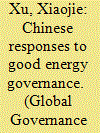

|
|
|
| 2 |
ID:
104868
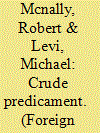

|
|
|
| 3 |
ID:
128728
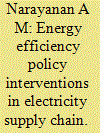

|
|
|
| 4 |
ID:
051901
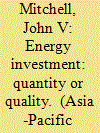

|
|
|
|
|
| Publication |
May 2004.
|
| Summary/Abstract |
The World Energy Investment Outlook, published by the IEA in November 2003, questions the conditions for financing future energy investments, especially in developing countries for the power sector, and for energy exports to the OECD. Mitchell reviews the role of governments in energy investment in OECD countries. This leads to a conventional wisdom about conditions which OECD investors would like to see, but not much guidance on issues of resource rents or conflicts arising from differences between local costs and national benefits. An "Institutional agenda" of initiatives (WTO, TRIMS, GATS and the Energy Charter Treaty) seeks to export OECD conditions and promote "good governance" in developing countries. There is also a "Behavioral agenda" in which international companies are persuaded to promote a variety of millennium goals, including human rights, poverty reduction, and environmental sustainability. These factors have different relevance in different countries in which major energy investments are foreseen. Finally, Mitchell suggests that "acceptability" is an inclusive concept under which the OECD type initiatives can be combined with regard for the circumstances and interests of the different non-OECD countries, to give an operational definition of investment "quality."
|
|
|
|
|
|
|
|
|
|
|
|
|
|
|
|
| 5 |
ID:
068017
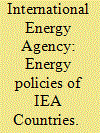

|
|
|
|
|
| Publication |
Paris, International Energy Agency, 2005.
|
| Description |
583p.
|
| Standard Number |
9264109390
|
|
|
|
|
|
|
|
|
|
|
|
Copies: C:1/I:0,R:0,Q:0
Circulation
| Accession# | Call# | Current Location | Status | Policy | Location |
| 050899 | 333.79/INT 050899 | Main | On Shelf | General | |
|
|
|
|
| 6 |
ID:
103454
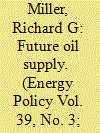

|
|
|
|
|
| Publication |
2011.
|
| Summary/Abstract |
The IEA was established in 1974 with a mandate to promote energy security amongst its members, namely the states of the OECD, and to advise those members on sound energy policy. Its recent forecasts of the medium and long term prospects for oil supply, however, have wavered, alternating from optimistic to pessimistic and back again. For policy-makers, such inconsistency is difficult to deal with. Firstly we examine whether the changing outlooks seen in IEA forecasts made between 2007 and 2010 truly reflect a demonstrable, underlying change in the known facts, and we can find no such factual changes reported by the IEA. Secondly we examine whether the serious criticisms of the IEA's (2008) forecast made by other analysts have yet been addressed, and we conclude that they have not. Thirdly we consider the possible effects of the current economic downturn upon the IEA's assumptions and upon future oil supply. We conclude that all the forecasts made by the IEA appear to be too optimistic throughout this period.
|
|
|
|
|
|
|
|
|
|
|
|
|
|
|
|
| 7 |
ID:
109795


|
|
|
| 8 |
ID:
115426


|
|
|
| 9 |
ID:
144683


|
|
|
|
|
| Summary/Abstract |
This article examines the reasons why the Israeli government chose not to apply for membership in the International Energy Agency (IEA), though it has been eligible to do so since 2010. The many benefits the IEA has to offer Israel in terms of enhancing its energy sector’s security, advancing environmental policies, and further integrating it with international markets and standards indicate that Israel would be wise to join the agency. A number of examples of the problematic process by which energy and environmental policy decisions are made in Israel will be used to illustrate this argument. Despite these benefits, Israel has rejected any notion of membership following a 2010 interdepartmental discussion between several ministries. The arguments raised during these discussions help shed some light on how the ‘security-mindset’ that tends to dominate Israeli policymaking serves as a limit to Israel’s potential progress of both its energy sector and its environmental policies.
|
|
|
|
|
|
|
|
|
|
|
|
|
|
|
|
| 10 |
ID:
115123


|
|
|
|
|
| Publication |
2012.
|
| Summary/Abstract |
Founded in response to the 1973 oil shock, the International Energy Agency (IEA) is arguably still the most important multilateral organization for energy-importing countries. Yet, the global geopolitical landscape has changed considerably since the IEA's creation. The rise of new energy consumers, new energy-related challenges and new international energy forums prompt a rethink of the agency's current role and institutional design. This article seeks to contribute to the recent debate on the future role of the IEA by examining specific drivers, avenues and constraints for institutional reform. The method used is SWOT analysis, which allows to summarize the key factors emanating from an assessment of an organization's internal characteristics (strengths and weaknesses) and its external environment (opportunities and threats). Building on this SWOT analysis, the article formulates a strategy for the IEA to remain the focal point in global energy governance. Key elements of this strategy include: stronger engagement with new consumers, rapprochement with OPEC, becoming a leading voice in the energy transition, and changing the agency's internal governance practices.
|
|
|
|
|
|
|
|
|
|
|
|
|
|
|
|
| 11 |
ID:
126061
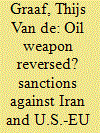

|
|
|
| 12 |
ID:
147306
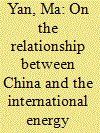

|
|
|
|
|
| Summary/Abstract |
As China needs to play a more active role in global energy governance, it must create a diversified, multi-level system to enhance energy security and to alleviate environmental pressures. A China-IEA bilateral relationship exists under an Association Initiative, but a stronger bond is needed. Though it is not an IEA member, China’s massive energy needs makes it sensible that the two sides overcome existing obstacles that include OECD membership, statistical information issues and energy autonomy. In this regard an “IEA+China” might be a feasible model.
|
|
|
|
|
|
|
|
|
|
|
|
|
|
|
|
| 13 |
ID:
063657


|
|
|
| 14 |
ID:
123731


|
|
|
|
|
| Publication |
2013.
|
| Summary/Abstract |
With the highest shale gas reserves worldwide and huge need for energy, the Chinese government has introduced many incentives to accelerate the development of shale gas, including subsidies and reduction or waiver of the related fees or taxes. However, the challenges posed by a lack of advanced technologies, environmental protection, a shortage of water in quantity and a knowledge of how to develop a good industry-local community relationship are anticipated in the realization of the predicted golden age of the Chinese shale gas industry. Based on the particular situation and available resources in China, and with reference to the experiences in countries with a developed shale gas industry (such as the U.S.A.) and suggestions by the International Energy Agency, recommendations about the choices facing China can be summarized as follows: allowing foreign investors directly to hold exploration and mining rights in shale gas could facilitate the obtainment of advanced technologies; the improvement of the regulatory arrangements related to environmental protection could make developers more responsible; prompting developers to improve their water-use efficiency could help in not worsening the water supply to some extent; and SLO-based mechanism guidance could be helpful in developing a mutual-trust and -benefit relationship between the shale gas industry and the local community
|
|
|
|
|
|
|
|
|
|
|
|
|
|
|
|
| 15 |
ID:
106050
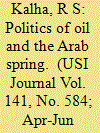

|
|
|
| 16 |
ID:
126203


|
|
|
| 17 |
ID:
137586


|
|
|
|
|
| Summary/Abstract |
Solar power has been declared a winner before, only to flounder. It’s easy to remain skeptical today, given that solar power accounts for less than one percent of the global energy supply. But it is also expanding faster than any other power source, with an average growth rate of 50 percent a year for the past six years. Annual installations of photovoltaic panels increased from a capacity of less than 0.3 gigawatts in 2000 to 45 gigawatts in 2014—enough to power more than 7.4 million American homes. This time really is different: solar power is ready to compete on its own terms.
|
|
|
|
|
|
|
|
|
|
|
|
|
|
|
|
| 18 |
ID:
175028
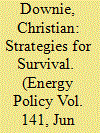

|
|
|
|
|
| Summary/Abstract |
Changes in the international balance of power, transformations in global energy markets, and the proliferation of new energy organizations have left the IEA facing a potential crisis. Traditionally scholars assume that international organizations, such as the IEA, have little autonomy to respond to changes in the international environment. While empirical studies have shown that this does not always match reality, almost no scholarship has focussed on these issues in the domain of energy. In particular, on the strategic role that international organizations can play in their own right and the impact this could have on the existing international energy architecture. This paper seeks to address this gap by focussing on the behaviour of the IEA since 2015 when it commenced a modernisation programme. Drawing on interviews with energy officials, it identifies the key pressures shaping the IEA's environment, the IEA's strategies in response, and the extent to which the IEA's has had autonomy from member states to pursue its strategies. The empirical analysis highlights that policymakers should pay greater attention to the strategic actions of organizations like the IEA and the way they can shape the contours of the energy domain.
|
|
|
|
|
|
|
|
|
|
|
|
|
|
|
|
| 19 |
ID:
129123


|
|
|
| 20 |
ID:
120977


|
|
|
|
|
| Publication |
Paris, International Energy Agency, 2012.
|
| Description |
668p.Pbk
|
| Standard Number |
9789264180840
|
|
|
|
|
|
|
|
|
|
|
|
Copies: C:1/I:0,R:1,Q:0
Circulation
| Accession# | Call# | Current Location | Status | Policy | Location |
| 057345 | 333.79011/INT 057345 | Main | On Shelf | Reference books | |
|
|
|
|